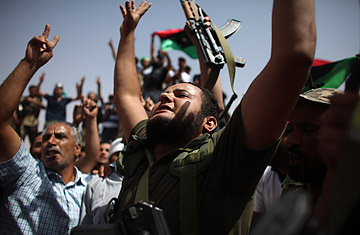
Rebel fighters celebrate in a mosque at a checkpoint between the Libyan towns of Tarhouna and Bani Walid on Sept. 6, 2011, as tribal elders and rebel leaders resume negotiations
For a moment, it looked as if the crisis of Bani Walid, one of Muammar Gaddafi's purported cities of refuge, had been averted. After being shut for hours of negotiations between rebels and Bani Walid elders, the doors of the Wishtata mosque in the adjoining town of Tarhouna opened, and word spread that the Gaddafi stronghold had agreed to surrender. The couple hundred rebels gathered outside began to chant "God is great!" and unleashed a celebratory melee of eardrum-shattering gunfire. "The blood of the martyrs won't be wasted for nothing!" the fighters cried. For a few seconds, the giddiness grew. With bloodshed seemingly avoided and victory near, the fighters talked of entering the desert town, which lies some 40 miles (65 km) southeast of where they had massed for nearly a week.
But the celebration, as is often the case in Libya, was premature. "There's no agreement," Muftah al-Rabbasi, a town elder, pronounced as he and fellow negotiators spilled out of the mosque several minutes later. "But there's an understanding," he added carefully. The understanding appears to be this: no one wants a fight.
Officials in the rebels' National Transitional Council (NTC) say that's why the standoffs over key towns like Bani Walid, roughly 90 miles (145 km) southeast of Tripoli, as well as Gaddafi's hometown of Sirt and the southern garrison town of Sabha, have dragged on for weeks after the regime's collapse in the capital.
But it may be just as possible that the rebels would like to avoid a bloody and globally embarrassing scene if civilians — not just forces — in Gaddafi's stronghold towns fight back. Indeed, it remains unclear, even amid rebels' recent grandstanding about their level of support across the country, whether surrender will ultimately come willingly or not.
Outside of Bani Walid on Tuesday, Sept. 6, rebel negotiators promised their Gaddafi-loyalist counterparts that the NTC would work to repair basic services in the town as soon as they were allowed to enter. Others pointed out that they surrounded the town on only three sides. "One side to let them escape," said Abdel Basid Hussein, a rebel fighter from the nearby town of Gharyan.
Earlier in the week, rebels claimed that Gaddafi's government spokesman Moussa Ibrahim and possibly two of Gaddafi's sons were holed up in Bani Walid. But on Tuesday, many said they believed the important regime figures had fled. Wire services reported that a heavily armed convoy of Gaddafi loyalists had entered the central Nigerien town of Agadez late Monday. The convoy could have crossed from Libya or Algeria (to which several Gaddafi kin have already fled) into Niger. On Tuesday, it appeared to be moving in the direction of Niger's capital, Niamey, near the country's southern border with Burkina Faso, where Gaddafi has been promised a safe haven.
Still, there are enough loyalists left in Bani Walid to keep the rebels from making any sudden movements. And in the negotiations in the little mosque outside of Bani Walid, the rebels had been careful to let local allies — who also happen to be members of the town's majority Warfalla tribe — do the talking. "We let the [rebels'] people from Bani Walid go first," explained Hussein, who belongs to a different tribe. "We don't want them to feel like they are being liberated by other people."
Bani Walid's own split between Warfalla rebels and Warfalla loyalists reveals the complexities of a war that the Gaddafi family has long tried to cast as tribal. But the fact that negotiations are necessary also suggests that certain tribes, like the Warfalla (Libya's largest), may remain predominantly in the Gaddafi regime's camp. "Now they will go to Bani Walid and sit together," said Muftah Salem, a rebel fighter from Tarhouna, as the group of sheiks from Bani Walid headed home. "They are afraid of a reaction from inside Bani Walid. They need time."
The elders say that means time to dispel propaganda that the rebels will enter the town murderously raping and pillaging, as many of the townspeople fear. For those who support the regime, concerns over retribution linger. And despite the rebels' pledges of justice and a speedy resumption of basic services like water and electricity, many of the antiregime fighters say they're prepared to arrest loyalists.
"The most challenging thing right now is a lack of understanding, in that some people in Bani Walid still have a bad idea about the revolutionaries," said al-Rabbasi. "When I bring back the true picture of the revolutionaries, at least that will reduce casualties."
As al-Rabbasi headed home, a fresh round of cheers broke out as a new rumor circulated through the crowd. Sirt, they said, apparently hearing the success story of Bani Walid, had surrendered. "Sabha too," one man shouted as rebels turned their Kalashnikov rifles skyward again, spraying onlookers with bullet casings.
Conspicuously, no one was racing off to either of the towns. And later in the afternoon, the resolution appeared to break down entirely when rebels told reporters that Gaddafi loyalists around Bani Walid had opened fire on tribal leaders. But by nightfall, it was back on.
